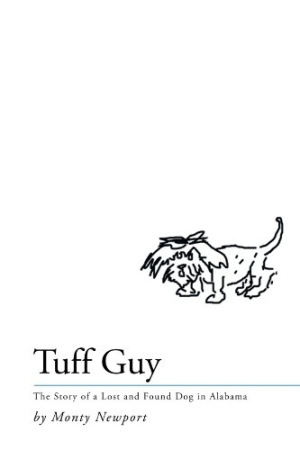Tuff Guy
The Story Of A Lost And Found Dog In Alabama
Monty Newport’s Tuff Guy is one of those rare books with a cover that accurately portrays the stellar qualities of its contents. The captivating line-drawing caricature of “Tuff,” as Newport’s adopted stray dog comes to be called, is as appealing as the tales he tells about the partially blind and mostly deaf Maltese that looked “like a road kill possum” when Newport found him. Tuff’s appearance was due to malnutrition, a yeast infection, and extreme hair loss after his abandonment and ensuing travels to and from only he knows where.
Finding the loveable Tuff inspired Newport to recreate and publish the geriatric pooch’s stories. In doing so, he gives Tuff various aliases and thrusts him into numerous escapades across Alabama and Iowa with an ensemble cast of humans, felines, and canines, both good and bad. A highly readable, family-friendly volume with a heart-wrenching ending, Tuff Guy just misses top marks due to its numerous typos and an annoyingly repetitious misuse of “whom” when “who” is required.
Newport has a keen sense for the readability of his work, except as noted above. His chapters are brief, his language concrete and concise, and his imagery colorful. Some scenes in the smoothly structured plot are humorous, some poignant, some surprising, and all of them are worth reading for inspiration and entertainment. One episode of a logging truck and a car ominously headed towards each other on separate roads is told with maximum dramatic tension. On the other hand, a scene with a menacing pit bull that breaks her restraints and vaults into a neighbor’s yard ends with a totally unexpected twist. Several dog’s-eye views of Tuff compensating for his auditory and visual impairments with his sense of smell reinforce the dog’s resiliency and encourage the readers’ empathy for him.
Newport’s human and animal characters are all well drawn, though some appear only briefly. A woman with a cluster of cats and an Alzheimer’s affliction is particularly memorable. So is Tuff’s teenaged mistress and her repetitive playing of Barbara Streisand’s “The Way We Were” as she brushes his scant and dishevelled coat. And then there is the courageous “Big Black,” the dog that leads the almost blind Tuff to safety as an Animal Control officer with a loaded shotgun tracks them down. All of Newport’s dialogue rings true, though it sometimes comes with a jolt of candor, as when one character exclaims, prophetically, “They ain’t nuthin’ good that comes of buckshot hitting a man’s crotch” to explain a hunting accident to an injured man’s wife.
The several black-and-white photos of Tuff in the end pages of the volume are additional proof of why the remarkable Maltese merits the book’s endearing front-cover drawing. Newport has penned a highly commendable tribute to Tuff through the telling of the beloved dog’s make-believe journey.
Reviewed by
Wayne Cunningham
Disclosure: This article is not an endorsement, but a review. The publisher of this book provided free copies of the book and paid a small fee to have their book reviewed by a professional reviewer. Foreword Reviews and Clarion Reviews make no guarantee that the publisher will receive a positive review. Foreword Magazine, Inc. is disclosing this in accordance with the Federal Trade Commission’s 16 CFR, Part 255.

